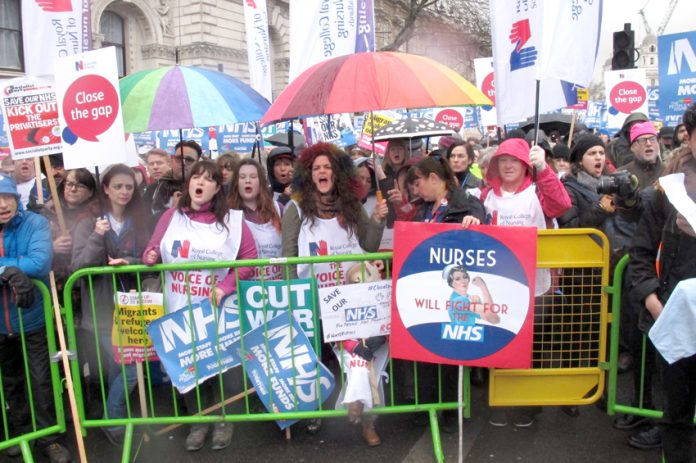
THE GMB is recommending that its members vote to reject the Tory government’s ‘jam tomorrow’ NHS pay offer. It says: ‘For long-serving NHS workers a 6.5% increase over three years actually means a real- terms pay cut with inflation set to hit 9.6% during same period says the GMB.
‘The OBR forecasts that RPI inflation is set to increase by 9.6% over the next three years.
‘Since 2010, paramedics have lost an average of over £14,000, midwives £18,000 and staff nurses £14,500 thanks to the government’s cruel and unnecessary pay cap. ‘GMB cannot recommend members sign up for yet more pay cuts.
Kevin Brandstatter, GMB National Officer, said: ‘Jeremy Hunt”s promise of jam tomorrow is simply not good enough for NHS workers who, during the past eight years, have faced the biggest pay pinch in living memory. ‘Long-serving, dedicated health service workers have had thousands of pounds swiped from their pay packets since 2010 by the government’s cruel and unnecessary pay cap. ‘After all that suffering, is a below-inflation pay rise the best they can offer?
‘If it is, GMB will have to recommend that our members in NHS and Ambulance Trusts reject it. ‘This deal won’t allow them to claw any of that cash back – in fact, for longer serving, most loyal NHS workers, the 6.5% increase over three years actually means a real-terms pay cut. ‘This deal doesn’t put things right and continues to punish those who have endured the pinch on pay.
‘It does nothing to address the recruitment and retention crisis that is driving workers from our NHS and has left 100,000 positions unfilled. ‘And it leaves the door being opened to new employees in the NHS being employed on worse terms and conditions than existing health service workers through third party shell companies, which is deeply troubling.’ Unite wants its members to accept the deal.
Unite national officer for health Sarah Carpenter said: ‘Unite welcomes many aspects of this deal, on which we will be consulting our membership over the next couple of months. However, we regard this as the start, not the end, of the journey for true pay justice for NHS staff, which we will campaign for with vigour in the coming months and years.
‘This is something, we believe, the government should have done a long time ago – and they should do so now for other public sector workers who have endured a similar rigid pay policy.’ She continued: ‘In the first year of the three-year deal, the vast majority of staff who are at the top of their pay band currently will see an increase of three per cent. Over the three years of the deal, this will have a cumulative value for them of 6.5 per cent.
‘For the staff progressing their career, the new career progression framework will mean they will see increases in excess of this figure. ‘This is underpinned by increased starting rates for all new joiners to the NHS – at all grades. ‘We hope that this package, hammered out after long and intense negotiations, heralds a new realistic pay dawn for NHS staff and goes some way to meet the recruitment and retention crisis in the health service.
‘Unite’s national health committee has discussed the deal and agreed to put it out for the members to decide, with the recommendation to accept. Our work is now to inform and consult our membership. They will be balloted during April and May, at the same time as other NHS unions.’
The Royal College of Nursing Chief Executive and General Secretary, Janet Davies, said: ‘Today’s deal is neither a magic wand nor a blank cheque but commits significant government cash to overlooked NHS staff without making any unpalatable demands in return. For that reason, we will be asking members to vote in favour.’
In the House of Commons yesterday, Health Secretary Hunt said: ‘The agreement which NHS trade unions have recommended to their members today is a something-for-something deal which brings in profound changes in productivity in exchange for significant rises in pay.
‘It will ensure better value for money from the £36 billion NHS pay bill, with some of the most important changes in working practices in a decade, including a commitment to work together to improve the health and wellbeing of NHS staff to bring sickness absence in line with the best in the public sector.’